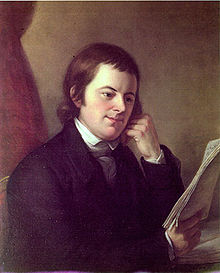Thomas Johnson (Governor)
Thomas Johnson (born November 4, 1732 in Calvert County , Province of Maryland , today's US state of Maryland , † October 26, 1819 in Frederick , ibid) was an American lawyer and politician who was the first elected in his life Governor of his native state, member of the Continental Congress and advisory judge to the Supreme Court .
biography
Youth and education
Son born and the fourth of ten children of Thomas and Dorcas Sedgwick Johnson, Thomas Johnson was already one of the second generation of Johnsons that in the Americas the light of the New World saw. His grandfather, also baptized Thomas, had worked as a lawyer in London before moving to Maryland sometime before 1700. All of the Johnsons had large families and were soon related by marriage to the country's ruling elite. Thomas' niece Louisa Johnson , the daughter of his brother Joshua Johnson, was married to the future US President John Quincy Adams .
In the absence of educational institutions, Thomas and his siblings were brought up in the local area with the help of private tutors. These must have done their job very nicely, as the younger Thomas was drawn to law, studied it, and was admitted to the Maryland Court of Justice in 1753. Around 1760 he moved his office to Frederick County . Shortly afterwards, he was elected to the provincial assembly for the first time. On February 16, 1766, Thomas Johnson married Ann Jennigs, the daughter of an Annapolis judge . The marriage had four children: Ann, Rebecca, Dorcas and Joshua.
During the war of independence
In 1774 and 1775, the Maryland Congregation sent him as a delegate to the Continental Congress . In Congress he was a firm supporter of the party that called for the separation , i.e. the detachment from Great Britain . Thomas Johnson was also the one who nominated George Washington as military leader of the Continental Army in June 1775 .
He soon returned to his hometown to continue his political work there. As a result, however, he lost any chance of participating in the drafting of the United States' Declaration of Independence . Since the declaration was later included as the first part of the first constitution, it was also adopted in that of his state of Maryland in 1776.
Johnson did not even evade military service: As a brigadier general , he was responsible for raising militia units in Maryland. In addition to his political activities, he failed - true to the customs of the time - not to draw any economic profit from the war. In his rifle factory, the remains of which can be found outside Frederick , he had muskets made for the revolution.
When Maryland began exercising his newly declared autonomy , the Legislature elected him Maryland's first governor in 1777. However, he only worked in this post for two years. During the 1780s he held various legal positions within Maryland and served in the state assembly in 1780, 1786, and 1787. In 1785 he was a member of the Virginia and Maryland Legal Commission that met at Mount Vernon to review legislation and to accord the navigation rights on the Potomac River . In 1788 he was also a member of the Constituent Assembly of Maryland, where he successfully pursued the ratification of the American constitution.
In the service of the federal government
In September 1789, President Washington nominated him as the first federal judge for the district of Maryland, but Thomas turned it down because he wanted to limit himself to local legal issues. In 1790/91 he sat accordingly before the Maryland Supreme Court. However, when John Rutledge resigned in 1791, George Washington managed to convince the hesitant Johnson and bring him to the Supreme Court . It was there that Johnson stepped in as the author of the first landmark judgment, "Georgia vs. Brailsford “immediately pioneering new territory. As his health deteriorated, he resigned from this office in February 1793. When Washington wanted to appoint him attorney general two years later, he had to refuse for health reasons.
On February 28, 1801, President Adams appointed him chief judge of the territory of the "District of Columbia", the future capital. As a result, Johnson was also a member of the commission that had to rule on the federal capital. Johnson is considered to be the politician who first advocated the Washington DC name .
Retreat into private life
His daughter Anne married John Colin Grahame in 1788. After retiring into private life, Thomas spent his last years in their house. Rose Hill Manor is now a county park that is open to the public. Johnson struggled with health problems for many years and died at Rose Hill Manor on October 26, 1819. He found his final resting place in Mount Olivet Cemetery in Frederick.
literature
- Edward Delaplaine: The Life of Thomas Johnson: Member of the Continental Congress, First Governor of Maryland, and Associate Justice of the United States Supreme Court. 1998 paperback edition: Heritage Books, ISBN 1-58549-687-1 .
Web links
- Johnson's Congressional Biography (English)
- Maryland archives image of 1776 Declaration of Rights (English)
- Thomas Johnson in the database of Find a Grave (English)
| personal data | |
|---|---|
| SURNAME | Johnson, Thomas |
| BRIEF DESCRIPTION | American politician and judge |
| DATE OF BIRTH | November 4, 1732 |
| PLACE OF BIRTH | Calvert County , Maryland , British Empire |
| DATE OF DEATH | October 26, 1819 |
| Place of death | Frederick , Maryland , United States |


